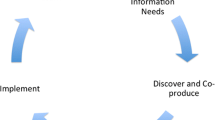Abstract
The third National Climate Assessment (NCA3) included goals for becoming a more timely, inclusive, rigorous, and sustained process, and for serving a wider variety of decision makers. In order to accomplish these goals, it was necessary to deliberately design an information management strategy that could serve multiple stakeholders and manage different types of information - from highly mature government-supported climate science data, to isolated practitioner-generated case study information - and to do so in ways that are consistent and appropriate for a highly influential assessment. Meeting the information management challenge for NCA3 meant balancing relevance and authority, complexity and accessibility, inclusivity and rigor. Increasing traceability of data behind figures and graphics, designing a public-facing website, managing hundreds of technical inputs to the NCA, and producing guidance for over 300 participants on meeting the Information Quality Act were all aspects of a deliberate, multi-faceted, and strategic information management approach that nonetheless attempted to be practical and usable for a variety of participants and stakeholders.



Similar content being viewed by others
Notes
Legal reference: Global Change Research Act of 1990, 15 U.S.C. §§ 2921–2961: http://www.gpo.gov/fdsys/pkg/USCODE-2011-title15/html/USCODE-2011-title15-chap56A.htm
In lieu of a consolidated NCS, regional climate services have increased extensively in several USGCRP agencies
References
Buizer JL, Dow K, Black ME, Jacobs KL, Waple A, Moss RH, Moser S, Gustafson DI, Richmond TC, Hays SL, Field CB (2015) Building a sustained climate assessment process. Clim Chan. doi:10.1007/s10584-015-1501-4
Dilling L, Berggren J (2014) What do stakeholders need to manage for climate change and variability? A document-based analysis from three mountain states in the western USA. Reg Environ Chang. doi:10.1007/s10113-014-0668-y
Grant Wood Area Education Agency (2010). Literature Review: Assessment for Learning (Formative Assessment). Grant Wood Area Education Agency. http://www.gwaea.org/iowacorecurriculum/docs/AssessmentForLearning_LitReviewFinal.pdf
Jacobs KL, Buizer JL (2015) Building community, credibility and knowledge: the third U.S. National Climate Assessment. Clim Chang. doi:10.1007/s10584-015-1445-8
Kunkel KE, Moss R, Parris A (2015) Innovations in science and scenarios for assessment. Clim Chang. doi:10.1007/s10584-015-1494-z
National Oceanic and Atmospheric Administration, (2014), revised. National Oceanic and Atmospheric Administration Information Quality Guidelines [Available online at http://www.cio.noaa.gov/services_programs/info_quality.html
NOAA National Coastal Data Development Center, cited (2014). Metadata Standards. [Available online at http://www.ncddc.noaa.gov/metadata-standards/]
Ma X, Fox P, Tilmes C, Jacobs K, Waple AM (2014) Capturing provenance of global change information. Nat Clim Chang 4:409–412
Moss RH (2015) Assessing decision support systems and levels of confidence to narrow the climate information “usability gap”. Clim Chang. doi:10.1007/s10584-015-1549-1
Office of Management and Budget, (2001). Guidelines for Ensuring and Maximizing the Quality, Objectivity, Utility, and Integrity of Information Disseminated by Federal Agencies,” 66 Federal Register 189 (28 September 2001), pp. 49718–49725 http://www.uspto.gov/products/catalog/infoqualityguide.jsp
Office of Management and Budget, (2002). Information Quality Act Final Guidelines http://www.whitehouse.gov/sites/default/files/omb/fedreg/reproducible2.pdf
Tilmes, C., Fox, P., Ma, X., McGuinness, D., Pinheiro-Privette, A., Smith, A., Waple, A.M., Zednik, S., and Zheng, J., (2013). Provenance Representation for the National Climate Assessment in the Global Change Information System. Trans on Geosci and Remote Sens. Volume: 51, Issue: 11 doi:10.1109/TGRS.2013.2262179, pp 5160–5168
USGCRP, (2010a). The United States national climate assessment NCA report series, vol. 1: Midwest Regional Workshop: Feb. 22-24, 2010, Chicago, Illinois. USGCRP
USGCRP, (2010b). The United States national climate assessment NCA report series, vol. 2: Strategic Planning Workshop. USGCRP
USGCRP, (2010c). The United States national climate assessment NCA report series, vol. 3: Knowledge Management Workshop. USGCRP
USGCRP, (2011). Inf Qual Princ, at http://www.globalchange.gov/sites/globalchange/files/Information-Quality-Principles-Draft_2011-11-16.pdf
Acknowledgments
This paper is an assessment of the information management process associated with the NCA, however the Global Change Information System project included many key contributors and a wide variety of input. While it is not possible to name all of the GCIS contributors, those who played critical roles include: Anna Pinheiro Privette, April Sides, Steve Aulenbach, Andrew Buddenberg, Glynis Lough, Robert Wolfe, Brian Duggan, Justin Goldstein, Angel Li, RPI Tetherless World Constellation staff, NEMAC, Habitat Seven, the GCIS Interagency Working Group, the NCADAC, and the staff of both the NOAA Technical Support Unit and the USGCRP Coordination Office.
This work was partially supported by NOAA through the Cooperative Institute for Climate and Satellites — North Carolina under Cooperative Agreement NA14NES432003.
Author information
Authors and Affiliations
Corresponding author
Additional information
This article is part of a special issue on “The National Climate Assessment: Innovations in Science and Engagement” edited by Katharine Jacobs, Susanne Moser, and James Buizer.
Rights and permissions
About this article
Cite this article
Waple, A.M., Champion, S.M., Kunkel, K.E. et al. Innovations in information management and access for assessments. Climatic Change 135, 69–83 (2016). https://doi.org/10.1007/s10584-015-1588-7
Received:
Accepted:
Published:
Issue Date:
DOI: https://doi.org/10.1007/s10584-015-1588-7




